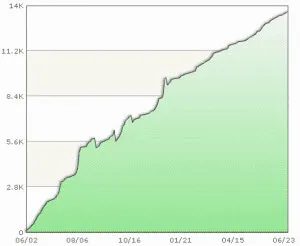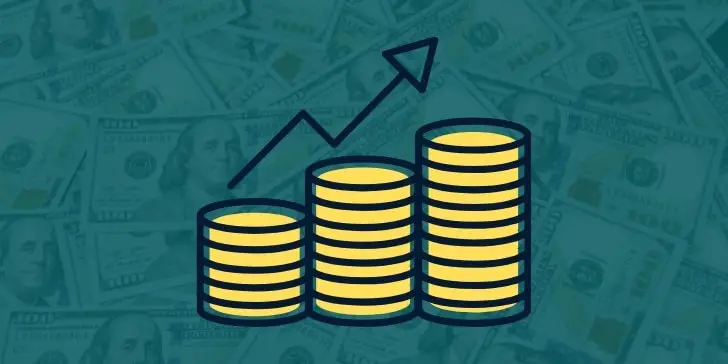One of the most debilitating experiences that a trader can suffer, especially if you are a novice, is coping with a series of consecutive trading losses. How do you deal with this experience as a trader? How do experts keep their cool, and recover their losses when this happens to them?
The Dangers of Consecutive Trading Losses
Strangely enough, statistics show that many beginners manage to achieve some degree of success during their honeymoon period of trading. Unfortunately, the thrill of producing such profits has the tendency to breed overconfidence. There is also a natural inclination to treat profits in a more cavalier way than your original funds.
Once this dangerous trend sets in, investors may start to rack up a sequence of consecutive trading losses. Seeing their trading accounts dwindling away, they often dig themselves even deeper into the hole in a desperate attempt to recover those losses. They may start to overtrade and overleverage their accounts by trading more often and risking more then they should.
To make things worse, traders often get right back into the market after a loss (revenge trading). This typically means that these subsequent trades are emotionally based, which is always a bad idea. Little or no thought is given to the real technical or fundamental analysis that trades should be based upon.
You’re a Loser… and a Winner (Hopefully)
Unfortunately, trading is about both winning and losing. If you imagine your next 100 trades, what is a realistic assessment of the amount of losses you might incur? Even the most experienced traders would lose between 20 and 35 of those trades, and some of those losses are likely to come back-to-back.
Are you an expert trader? Are you profitable yet? If you are just starting to have some success in trading, chances are that you could be looking at as much as 50 losses or more during that same 100-trade period. Just thinking about this can be demoralizing.
So how can we deal with our losses, especially consecutive trading losses, and insure that our accounts live to fight another day? How can we keep our cool and recover our losses – as opposed to creating even more trouble, or even a disaster, for ourselves?
First, let’s go over what not to do.
Why Novices Lose More Than Experts
Often, a streak of consecutive trading losses is the result of a bad trade, followed by the desire to prevent a losing day and taking another more careless trade, and then followed by frustration and the desire to “get your money back.” This process, known as revenge trading, is one of the most common reasons that novice traders become liquidity providers for more disciplined traders and professionals.
Many novices try to combat trading losses by increasing the position size of each subsequent trade. However, unless you have addressed and corrected the central reason(s) for your failures, then this action will only accelerate your trading losses in increasingly larger amounts. As this approach is, in fact, nothing more than just another form of gambling, it is prone to eventual disaster.
Note: Even if you have corrected the mistakes, if there were any, that caused your losses, you should never increase your risk per trade to recover losses. There is a strategy that many gamblers and so called “traders” use, known as martingale, that involves doubling your risk after each loss to recover your whole loss. Although some traders have found initial success using this strategy, it is destined to fail in the long term.
Other traders try to correct consecutive trading losses by injecting new capital into their accounts. However, the logic of such an approach is very questionable to say the least. Several consecutive trading losses are, more often than not, a result of rookie trading mistakes. Consequently, your confidence will likely have taken a hit along with your equity, and you should first prove to yourself that you can be consistently profitable in the long term, before thinking about adding another cent.
How Professionals Limit and Recoup Losses
It should be no surprise, if you read this blog regularly, that money management is central to preserving capital in the trading business. More traders fail due to poor money management than any other singular cause. Professionals have great discipline when it comes to managing their risk exposure wisely.
In a recent article, I gave an example that showed the difference in losses between an account risking 2% versus an account risking 10%. In the unfortunate event that one were to lose 10 consecutive trades, an account risking only 2% per trade would suffer nearly a 17% overall loss – whereas an account risking 10% per trade would have lost more than 65% overall.
It is realistic to recover from a 17% loss, with patience and discipline; however, recovering from a 65% loss becomes exponentially more difficult. In that same example, a trader risking only 1% per trade would have lost less than 10% of their total account balance. Using this example, it is easy to see how less can sometimes be more in trading.
Professionals also usually choose profit targets that allow their wins to take care of their losses. The exception would be scalpers, who may take very small profits. If your average win is 2 to 3 times your risk per trade, than you can be profitable with a strike rate of less than 50%. However, if your average loss is larger than your average win, you must obviously maintain a much higher strike rate to be profitable.
Another aspect that sets experts apart from the average trader is that experts do not let their emotions dictate trading decisions. If they have a loss or two, instead of trying to “get their money back” right away, they have the psychological discipline to recognize that they are just not gelling with the market at that time.
It’s not an easy thing to do after a loss or two, but experts walk away from the market when they lose. Sometimes it can just be for an hour or two, other times it could be days before they return to trading. It is crucially important to recognize a state of mind that could lead to impulsive trading decisions, and take action to prevent yourself from doing further damage.
Many times, at this point, disciplined traders will revert to demo trading for a short period. This way, they can remove the stress of trading (and losing) real money, and objectively determine the cause(s) of their failed trades. If nothing was done incorrectly, demo trading can also be useful to determine when one’s trading system is gaining traction again, as periods of drawdown are inevitable in every trading system.
Final Thoughts
If the market has just handed you a beating, chances are that you are simply not in the best state of mind to continue trading. There is also a chance that your confidence has taken a good hit as well. It could be that you’re in the wrong place psychologically to successfully trade, or simply that the market is out of sync with your trading strategies at the moment.
When this happens you must have the discipline to walk away for a while. Remember that demo trading is not just for beginners, and use it as a tool to help you overcome consecutive trading loses – regardless of whether they are the result of errors in judgement or drawdown. Sometimes you just need to prove to yourself that you can be consistent in order to restore confidence in your trading method.
Even the best traders in the world lose regularly in the market, as losses are an inevitable part of trading. If you manage your money properly, however, you should have no problem surviving a string of bad trades – especially if your winners are larger than your losers on average.
You must keep yourself from being intimidated by the sight of a declining account balance. Controlling your emotions is critical in successful trading, and excellent psychological discipline is one thing that all professional traders have in common. Mistakes will happen, but if you remember these points and strive for a disciplined trading mindset, a string of consecutive trading losses will not slow you down much at all.






